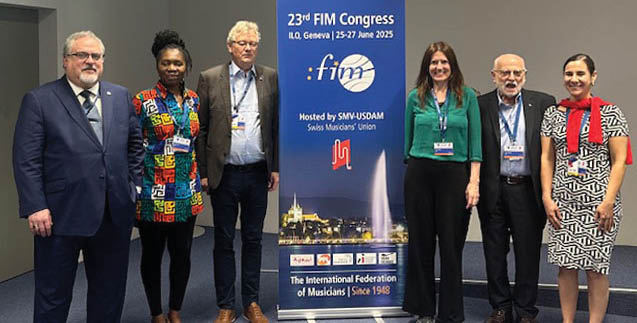As I write this column, I am preparing to travel to Athens, Greece, for an important conference that will discuss artificial intelligence (AI) and streaming on the global stage. “Music in the Digital Age: Streaming and AI” is an international gathering that brings together artists, industry professionals, academics, journalists, legal experts, policymakers, and technologists to study the future of music rights.
Creative industries worldwide are being reshaped by the rapid rise of AI-generated content and the dominance of streaming platforms. As musicians, we join other creatives who face unprecedented challenges as revenue streams are disrupted and legal frameworks have not kept pace. The conference will provide me with an opportunity to explore, with other leaders in our global creative economy, how performers, unions, and collective management organizations (CMOs) can adapt, negotiate, and shape a better future. I will provide a synopsis next month.
Preparations for negotiating a successor Sound Recording Labor Agreement (SRLA) with the major labels continue. Details of this agreement covering musicians hired to produce sound recordings was the subject of last month’s column. We are asking for member input and support as we work toward a progressive agreement. I will keep you informed as negotiations develop.
Strikes Averted on NYC Stages
October has been a busy month for Broadway negotiations with AFM musicians and actors threatening strikes over stalled contracts with The Broadway League. Both the AFM Local 802 and Actors’ Equity Association began negotiations in August but had seen little progress by mid-October.
The League had offered unacceptable wages along with reduced benefits and jobs, yet these workers risk their health and safety, while sharing their talents, so the shows can go on. Both Local 802 and Equity demanded that their members be treated with dignity.
While Broadway pit musicians represent a small fraction of AFM membership, what happens on Broadway reflects what is happening in theaters in North America and Puerto Rico. These negotiations have implications for musicians working in the theatrical trade industrywide, as well as other entertainers. Their priorities—livable wages, fair work rules, and health care—are important to all working musicians.
The struggle of Broadway musicians is a cause close to my heart, as I played trumpet in Broadway shows during the early years of my career. I served for many years as a member of the contract negotiation team for the Broadway Theatre Committee, as president of Local 802 (New York City), and as a member of the AFM Pamphlet B and Short Engagement Touring Theatrical Musicals agreement.
More than 14,000 members of the public signed a letter of support for Broadway musicians and actors, recognizing the humanity of workers and the value of their labor, and promising not to cross the picket line in the event of a strike.
The letter began: “I am a Broadway supporter, someone who loves spending my time being transported by the exciting, moving, and often magical worlds created on stage by the most talented artists in the world. The actors, musicians, stage managers, and everyone else who create these experiences eight times a week are why I spend my money on tickets, show after show.” It continued with a pledge of solidarity with the musicians, actors, and stage managers who make Broadway the best theater in the world.
The AFM received letters of support from elected leaders, including New York City and New York State politicians, as well as bipartisan members of Congress. They all recognized the cultural and economic contributions of Broadway musicians. (See article on page 6.)
These important negotiations were also watched internationally, with letters of support coming from both the British Musicians’ Union and the International Federation of Musicians (FIM). The FIM letter read, in part: “We commend your steadfast dedication to securing fair wages, stable health care, job security, meaningful employment, and the safeguarding of vital benefits for all musicians. The demands you have raised—reflecting the urgent need for remuneration that aligns with Broadway’s success, strong and reliable health benefits, protection against reductions in orchestra minimums, and stabilizing freelance musicians’ income—are entirely justified and align with the core principles we advocate for professional musicians worldwide.”
FIM’s willingness to stand with us shows that the fight for dignity, fair wages, and secure working conditions for musicians transcends borders. The international music community was united in support for this cause. The world was watching as we urged The Broadway League to recognize the artistic and economic contributions of these incredible artists and negotiate a fair agreement.
On October 18, Equity announced it had reached a tentative agreement on its Production Contract with the League after an all-night negotiating session. Al Vincent, Jr., Actors’ Equity executive director and lead negotiator, said they would now bring the deal before their members for ratification and that they were putting their “full support behind Local 802 as they work with the League to reach a deal that averts a strike.”
Less than a week later, on October 23, Local 802 Broadway musicians announced that a tentative agreement with the League had been achieved after another all-night session, thereby averting a planned strike.
Meanwhile, singers, dancers, and staging staff of the American Guild of Musical Artists (AGMA) have been bargaining for a new contract with the New York City Ballet (NYCB) since May. Their current contract expired August 31, and they are now performing without one. AGMA has been negotiating in good faith, and while they have seen some progress, management’s current proposal does not recognize the value of the performers’ work or even meet the rising cost of living in New York City.
An AGMA post from October 8, the evening of the Ballet’s annual Fall Fashion Gala, states, “The AGMA dancers and stage managers at the New York City Ballet are united. We remain optimistic that we can work with the NYCB so it can remain an industry leader in its treatment of artists. We’ll keep you updated as we continue pushing for a fair contract that reflects the value of our work.” The musicians of the NYCB, members of Local 802 (New York City), stand united in solidarity with these performers.
Read More



